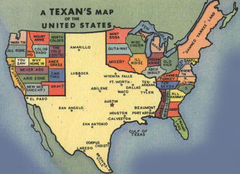It's a big ol' state, so there are variations in the Texan dialect and there are arguments to be had, but Texan dialects got a whole lot what's shared, too.
Origins of a Texan Accent
Texas has been fed by a lot of varied influences. The term "six flags over Texas" refers to the fact that Texas has had six different governing bodies at one time or another in the last three hundred years: Spain, France and Mexico all claimed portions of Texas for a time period until it declared independence in 1836. Then it joined the US in 1845 and seceded with other Southern states in 1861 before it was restored to the Union after the Civil War.
Nearly a third of Texans actually speak Spanish at home, and that number is likely to grow. The links with Spanish speakers goes back to the origins of Texas, though the accent was also strongly influenced by significant influxes of people from the US when Mexico adopted a more open immigration policy in the early 1800s. Into the mid-1800s, there was a major influx of whites from the Ozark and Appalachian Mountains that greatly affected the Texan accent.
Variations of Texas Accents
Texas contains a range of accents and dialects, including African-American Vernacular (black), Tejano (Spanish-influenced) and Cajun in the far southeastern corner of the state. The term Texas accents, however, usually raises the image of cowboys, ranches and rodeos. This isn't inaccurate, but there is a great deal more to the Texan dialect than that.
This primarily white Texan accent has two major sub-divisions: East Texas accents and West Texas accents. The tradition "cowboy" sound is more prevalent in the west, while the eastern sound has more twang to it. Actors John Wayne and Sam Elliott are prime examples of the West Texas drawl (though neither is from there!) and former Presidential candidate H. Ross Perot is a strong representation of the East Texas twang.
There also tends to be a difference between people who live in the larger cities of Texas and those who live in smaller cities and town and in more rural areas. Many city dwellers, such as Houston mayor Annise Parker, tend to have a much more Midwestern accent, though it may have sprinklings of the stereotypical Texan accent.

Texan Dialect
The term dialect as opposed to accent often implies focusing on word choice variations rather than sound changes.
There are a lot of shared sound changes and word choice variations that are prevalent throughout the South and make their way into the Texas dialect. Y'all is a commonly used plural form of you, and the term all y'allI is also commonly employed, especially for larger groups. Coke or soda is preferred over pop for soft drinks. Fixin' to is often attached to phrases, such as I'm fixin' to go into town.
Other terms are a bit more stereotypically elements of a Texan dialect, such as calling a farm pond a tank. Howdy is a very stereotypical Texan greeting, and sour milk is said to have gone blinky. If something doesn't fit right or is slightly off from what it should be, it's commonly said to be catty whompus. Most dialectical variations in Texas, however, are common in most other Southern accents.
Speak Texan
Texas is a big ol' state, so there's a whole lot more to the accent than you might initially think, though often actors are working towards that stereotypical cowboy accent of West Texas. The AccentHelp download covers both that and the East Texas twang in two volumes with recordings from across the state.
Texan is used in enough films and plays that it's a useful accent to have in your back pocket. A course, ya better be wearin' jeans if yer fixin' to speak with a Texan dialect.







